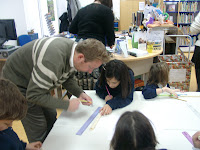Friday, May 22, 2009
Tuesday, April 28, 2009
Thursday, March 26, 2009
New song accompaniments for Year 5
"BB Blues" and "A bit more time" from page 7 and "Thinking" from page 8.
Year 6 accompaniment
"Got the EBGB's" accompaniment with practice tempo and performance tempo. When you can play well with the slow speed, start to practice with the performance tempo.
Friday, March 20, 2009
Friday, March 13, 2009
4B workshop in Gulbenkian
Thank you Mr.Lamaison and Mr.Costa!
Thursday, March 12, 2009
Friday, March 6, 2009
Rhythm session
Practice your rhythm excercises with the music! If you don't have difficulty with the first excercise, you can start clapping the following ones.
Wednesday, February 18, 2009
Year 1 percussion ensemble recording
Thursday, February 12, 2009
Year 1 percussion ensemble

Year 5 play along video
http://www.mymusicclass.com/Video/Wish%20I%20Was%20A%20Chicken/Wish%20I%20Was%20A%20Chicken.html
Tuesday, February 10, 2009
Year 6 Blues play along video
http://www.mymusicclass.com/Video/A%20Minor%20Blues/A%20Minor%20Blues.html
Monday, February 9, 2009
Year 2 music listening classes
- Beethoven: 5th symphony, first mov.
- Gershwin: Rhapsody in Blue
- Shostakovitch: Piano Concerto Nº2, Allegro
- Saint-Saens: Carnival of Animals, Finale
- Stravinsky: Fire Bird Suite
We have also tried to make up stories based on other music pieces. You can help your child by asking him/her to come up with a story while listening classical music.
Wednesday, February 4, 2009
3L performance in the Gulbenkian
Flute making with Year 4






Monday, January 26, 2009
Year 1 Unit of Inquiry musical connection
Year 4 Unit of Inquiry musical connection - Activity Day
- how the choice of a material influences the sound of musical instruments
- evolution of instruments in historical context
- influence of tecnology on the evolution of musical instruments
- traditional musical instruments are made of materials found in a specific geographical area
One of the most important instruments we will speak about is the flute, as flute type instruments exist in most areas of the world, and historically there is a straight evolution from renaissance flute to modern. To enrich the children's experience we will have an in-school activity day on the 3rd of February, Tuesday. An expert will come for a presentation of flutes and then an instrument making workshop will take place, where all children will make their own flute.
Tuesday, January 20, 2009
Friday, January 16, 2009
Music field trips to Gulbankian Foundation
For more information see www.musica.gulbenkian.pt/descobrir
Monday, January 12, 2009
K1 lyrics for assembly
One world turning, One world turning ev'ry one.
One world, one home, One world home for everyone.
One dream, one song, One song heard by everyone.
One love, one heart, One heart warming everyone.
One hope, one joy, One love filling everyone.
Year 5 recorder pieces for Term II
Wednesday, December 17, 2008
Friday, December 12, 2008
Tuesday, December 9, 2008
Question of the month - answer
Congratulations to Daire, Diego and Colette for answering correctly!
Sunday, November 9, 2008
Christmas songs
http://docs.google.com/Doc?id=drkd2wk_0hjbzgfm5
Thursday, November 6, 2008
Question of the month - November
He was a composer of the Baroque period. He composed about 300 concertos for different instruments for his students to perform. He lived most of his life in a very special city, built on water. He died in Vienna. Who is he?
Recorder fingering chart
You can play the other music games available on that page. The link is placed at the right side of the page, under musical games.
Recorders
http://www.salaomusical.com
Thursday, October 9, 2008
Notation resource


If you have questions related to music reading, this is a great resource. Year 5 and 6 make sure you read it!
http://books.google.com/books?id=QllMXBQ-kMcC&pg=PA23&lpg=PA23&dq=note+duration+chart&source=web&ots=hYBKt_Or2U&sig=U7mtCgi-iFw4wrgefIJokL7l8VM&hl=en&sa=X&oi=book_result&resnum=8&ct=result#PPP5,M1
Saturday, October 4, 2008
Question of the month - October
Friday, October 3, 2008
Year 2


During the whole class lessons we are are listening different types of music pieces. After a few weeks practice children are able to find out what type of music they hear.
The music styles are:
- Children's song
- Classical music
- Blues
- Samba
- Flamenco
- Tango (as a special request from Martinho)
We have started to do some rhythm excercises using percussion instruments where children are working in 3-4 groups.
Year 4
About rhythmic notation we looked at the expressions bar, barline and double-barline. They should be able to clap simple rhythmic phrases with long and short notes.
Both classes have practiced their song for this week's sharing - it was the first time Year 4 presented part-singing.
We already discussed the process of measuring time in music. Children are able to recognize and use music notes with 2 beats, 1 beat and half a beat.
Thursday, October 2, 2008
Year 5
Children should practice note reading - see musical games - to be ready to start playing the recorder fom November.
Year 6
Now we are listening and analysing national anthems.
Remember to visit the website http://www.national-anthems.net/ and http://www.national-anthems.org/anthems.php



























